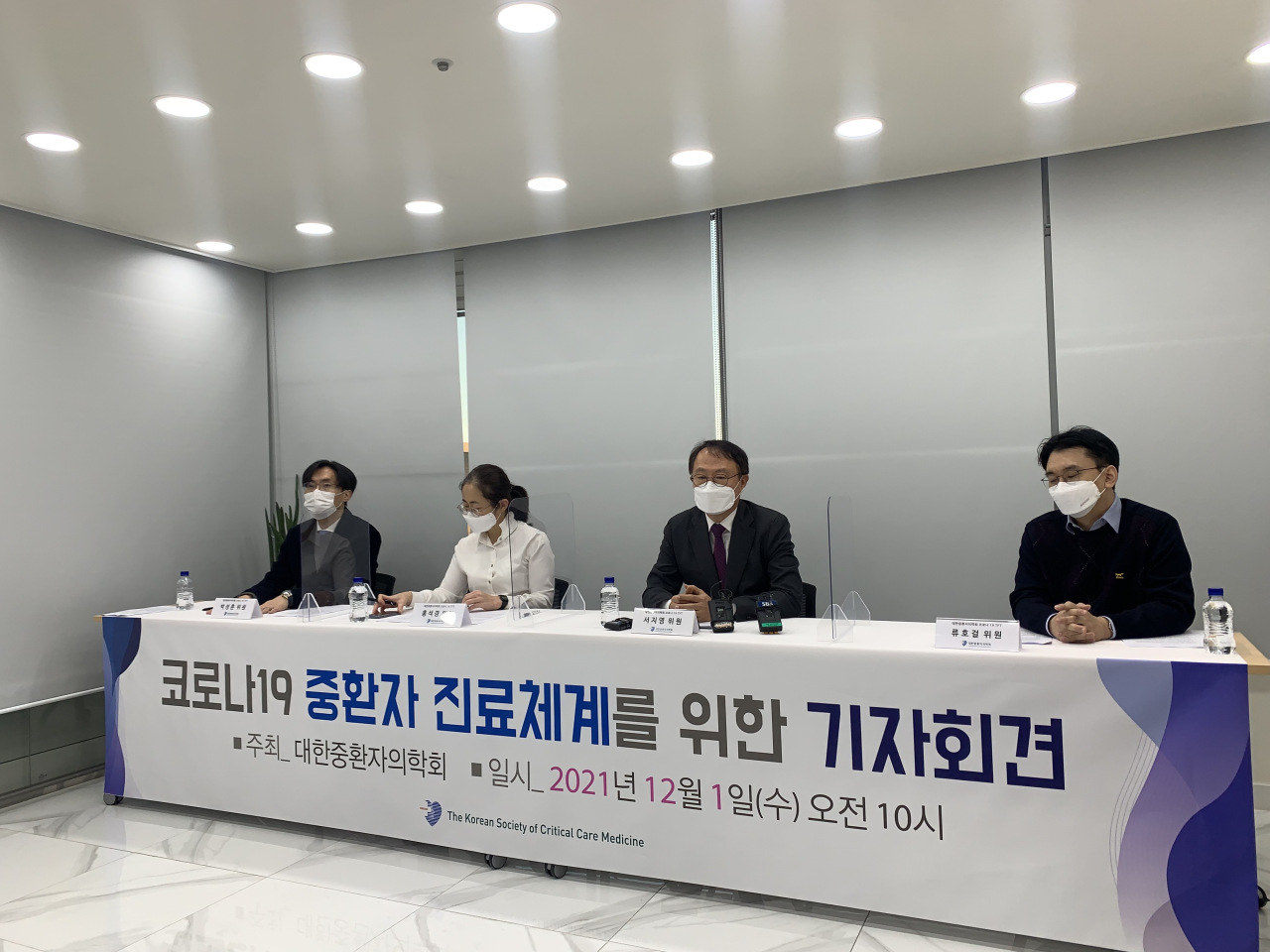Korea’s COVID-19 cases exceed 5,000 in one day for first time
ICU doctors say ‘return to normal was a mistake’
By Kim ArinPublished : Dec. 1, 2021 - 10:14

South Korea hit another ominous pandemic milestone as new cases of COVID-19 topped 5,000 for the first time on Wednesday.
After a monthlong surge in hospitalizations, intensive care unit doctors at the country’s top hospitals warned Korea may soon be forced to choose which patients get life-saving treatment.
The Korean Society of Critical Care Medicine held an emergency press conference on this day and warned the country was fast approaching a point of rationing ICU spots as the return-to-normal scheme pushes outbreak to worsen at unprecedented levels.
Trauma surgeon and critical care specialist Dr. Hong Suk-kyung of Asan Medical Center said the government’s bed assignment team needs to review the order of priority in which patients are being admitted to hospitals.
“The COVID-19 bed assignment policy fails to consider which patients may benefit most from critical care,” she said. Recently a pregnant woman in her 30s could not be admitted after the last vacant bed was taken up by an 89-year-old on life-sustaining treatment.
She said that the government, along with health care professionals, has “the responsibility to be upfront about these possibilities” and plan for the worst. “So far ICUs have managed to treat patients as they come. But that may not be going to be possible in the very near future, if the right steps aren’t taken. It may be that not everyone can get treatment,” she said.
Allotting larger shares of finite critical care resources to COVID-19 patients was failing non-COVID-19 patients who are just as ill, said critical care specialist Dr. Park Sung-hoon of Hallym University Sacred Heart Hospital.
The government approach for augmenting COVID-19 critical care capacity entailed taking away existing beds for non-COVID-19 critical care and turning them into COVID-19 ones, he said. “Which compromises the quality of care that patients get, and deprives other patients who aren’t a COVID-19 case of their chance at an ICU therapy.”
Park said that unlike general beds, there was a limit to how many beds can be added to a hospital’s intensive care unit as specialized staffing and infrastructure are needed. “We have to be strategic about how these resources can be utilized more efficiently, because it’s life and death.”
Dr. Ryu Ho-geol, an anesthesiologist at Seoul National University Hospital, said that surgeries or procedures that may lead to an ICU admission were already being postponed.
The ICU doctors all agreed that social distancing need to be brought back.
Dr. Suh Gee-young, critical care specialist at Samsung Medical Center, said kicking off getting back to normal plans ahead of winter had been “a mistake,” he said. “We could have waited until booster doses have gotten to more older people.”
The number of patients hospitalized with severe or critical COVID-19 more than doubled over the month Korea initiated its plans to abandon pandemic restrictions. On Nov. 1 there were 343 severely or critically patients in the country. On Wednesday the number had jumped to 723 -- the highest ever -- barely leaving 10 percent of all ICU beds free in and around Seoul.
The Korea Disease Control and Prevention’s Wednesday situation report showed 5,123 cases and 34 deaths were newly confirmed in the previous 24 hours, surpassing the record of 4,115 cases set on Nov. 24.
If Korea sticks with the present policy aimed at bringing life back to normal, daily cases could reach 10,000 by the end of January, according to a new forecast by preventive medicine specialist Dr. Jung Jae-hun.
Jung, who is a COVID-19 policy adviser at the prime minister’s office, said in a Nov. 30 forum organized by the National Academy of Medicine of Korea that some measures for minimizing the damage were necessary.
“Since the advent of the delta variant, controlling the outbreak solely through vaccination has become difficult,” he said, which contrasts with the rationale provided by the government when the country made the shift toward normal a month ago.
As Korea entered the first of the three-stage return to normal on Nov. 1, the Ministry of Health and Welfare had said the full vaccination rate of 70 percent would enable the change in the country’s COVID-19 response.
Meanwhile the full vaccination rate nationwide crossed 80 percent as of the data compiled on Wednesday at 11 a.m. Among adults 18 and older, the rate was much higher at 91 percent.
By Kim Arin (arin@heraldcorp.com)


















![[KH Explains] Hyundai's full hybrid edge to pay off amid slow transition to pure EVs](http://res.heraldm.com/phpwas/restmb_idxmake.php?idx=652&simg=/content/image/2024/04/18/20240418050645_0.jpg&u=20240418181020)

![[Today’s K-pop] Zico drops snippet of collaboration with Jennie](http://res.heraldm.com/phpwas/restmb_idxmake.php?idx=642&simg=/content/image/2024/04/18/20240418050702_0.jpg&u=)